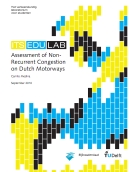Congestion is a problem that nowadays is facing people all over the world. It affects (in different degrees) developed countries as well as undeveloped. Congestion and queues on freeways cost money due to loss of time and therefore productivity. As a result it is considered important to assess it, in order to determine the severity of the problem faced. In the case of the Netherlands, a clear and accurate review of the causes of congestion and their contribution to vehicle loss hours is missing. For that reason, Rijkswaterstaat (RWS) proposed to investigate this topic.
The main subject of this report is to differentiate between diverse types of congestion. The main research objective is to design a method to automatically identify the recurrent and (the most common) non-recurrent delays during single occurrences, on Dutch motorways. To accomplish this goal, it was necessary to have a clear definition of congestion, which in this study was used travelling below a reference speed. It is also required to have a clear differentiation between recurrent and non-recurrent congestion. There are two main approaches to assess different congestion components: simulation-based and data driven. They both were examined in order to determine which would be the most suitable approach to be used in this study. Taking into account several factors, it was decided that the most promising approach is data-driven.
Based on the existing methodologies, a new method was proposed to assess and to distinguish the different parts of the congestion: recurrent and non-recurrent, expressed in terms of delays. The methodology was validated to show that its outcomes are realistic, and they are properly measuring the field conditions. The methodology was applied to a case study with real data. It was chosen a zone in the Randstad area including the A4, A13, A20, and A12 motorways in the Netherlands. The resulting delays data were analyzed and some conclusions were derived from the case study. It was found that in this area the A13 and the A20 present the higher congestion levels. It was also found that recurrent delays represent more than 50% of the total delays and among the considered causes of non-recurrent congestion, incidents is the one that occurs more often.
It was found in the results of non-recurrent delays classified as ‘other causes’ are higher than expected. Part of it is originated in bottlenecks whose cause is not among the databases. Therefore it is considered that although the quality of the existing information is high, it is still necessary more information about different kinds of occurrences, different from those considered in this study. The case study results are promising, however the developed methodology requires more data (in more motorways and considering more time) in order to derive more generic conclusions.
